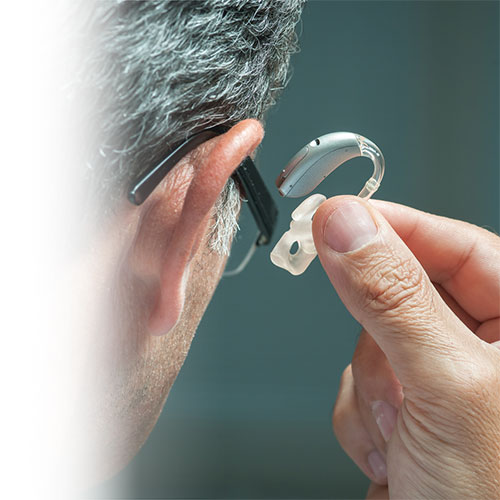Hearing aids
Hearing aids include two main types of devices: hearing prostheses and assistive listening devices such as decoders, teletype (TTY), telephone amplification devices, telephone ring detectors, an infrared system, etc. The hearing aid specialist is called an audioprosthetist.
A hearing prosthesis is a miniaturised electronic device that serves to amplify weak or inaudible sounds. Certain models are placed behind the ear, others are placed inside the ear. To maximize function and get the most out of the device, it must be adjusted according to the user’s needs, a complex task that is completed by the audioprosthetist.
The adjustment of a hearing prosthesis depends on a number of factors, such as the particularities of the device and the personal characteristics of the user (age, cognitive abilities, physical limitations, lifestyle, etc.). The audioprosthetist can assess all of the possibilities with you and help you choose the model, size and the technology most suitable to your needs. You will undoubtedly be impressed by the convenience and power of this small device!
If you must wear a hearing aid, here are some useful tips:
- Make sure you always have extra batteries on hand for your device, especially when you are going out. This will prevent a potentially embarrassing situation.
- When you buy new batteries for a hearing aid, be sure to check the expiry date to optimize performance. Keep them in their original packaging. Additionally, since they have a limited lifespan, save battery life by turning off the device during the night, for example.
- To optimize the device’s performance, be sure to clean it regularly as recommended by your audioprosthetist. Caring for it consistently will enable you to keep your device for a long time and to get the most out of it.
- Find out about financial assistance programs in your province for hearing aid wearers. Your hearing health specialist (otorhinolaryngologist, audiologist, audioprosthetist) can provide information about financial assistance and help you to benefit from these programs. This will enable you to maximize the use of available resources at your disposal without the financial worries.
- Do not isolate yourself because you are living with a hearing difficulty. Stay in touch with friends and family and tell them about your hearing health and the ways you use to better deal with it. If the people around you are aware of your situation, they can better adapt to it.
Today, there are many ways to live a fulfilling life, despite hearing loss. When it comes to hearing health, information is your best ally, and there are many professionals who can help you.


